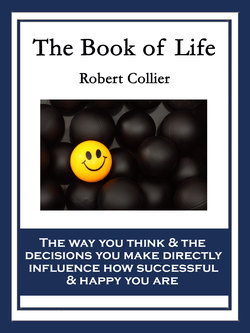Читать книгу The Book of Life - Robert Collier - Страница 17
На сайте Литреса книга снята с продажи.
The Philosopher’s Charm
ОглавлениеThere was once a shrewd necromancer who told a king that he had discovered a way to make gold out of sand. Naturally the king was interested and offered him great rewards for his secret. The necromancer explained his process. It seemed quite easy, except for one thing. Not once during the operation must the king think of the word Abracadabra. If he did, the charm was broken and the gold would not come. The king tried and tried to follow the directions, but he could not keep that word Abracadabra out of his mind. And he never made the gold.
Dr. Winbigler puts the same idea in another way: “Inspiration, genius, power, are often interfered with by the conscious mind’s interposing, by man’s failing to recognize his power, afraid to assist himself, lacking the faith in himself necessary to stimulate the subconscious so as to arouse the genius asleep in each.”
From childhood on we are assured on every hand—by scientists, by philosophers, by our religious teachers, that “ours is the earth and the fullness thereof.” Beginning with the first chapter of Genesis, we are told that “God said, Let us make man in our image, after our likeness; and let them have dominion over the fish of the sea, and over the fowl of the air, and over the cattle, and over all the earth—and over every living thing that moveth upon the earth.” All through the Old and the New Testament, we are repeatedly adjured to use these God-given powers. “He that believeth on me,” said Jesus, “the works that I do shall he do also; and greater works than these shall he do.” “If ye abide in me, and my words abide in you, ye shall ask what ye will, and it shall be done unto you.” “For verily I say unto you, that whosoever shall say unto this mountain, Be thou removed, and be thou cast into the sea; and shall not doubt in his heart, but shall believe that those things which he saith shall come to pass; he shall have whatsoever he saith.” “The kingdom of God is within you.”
We hear all this; perhaps we even think we believe, but always, when the time comes to use these God-given talents, there is the “doubt in our heart.”
Baudouin expressed it clearly: “To be ambitious for wealth and yet always expecting to be poor; to be always doubting your ability to get what you long for, is like trying to reach east by traveling west. There is no philosophy, which will help a man to succeed when he always doubts his ability to do so, and thus attracting failure.
“You will go in the direction in which you face . . .
“There is a saying that every time the sheep bleats, it loses a mouthful of hay. Every time you allow yourself to complain of your lot, to say, ‘I am poor; I can never do what others do; I shall never be rich; I have not the ability that others have; I am a failure; luck is against me;’ you are laying up so much trouble for yourself.
“No matter how hard you may work for success, if your thought is saturated with the fear of failure, it will kill your efforts, neutralize your endeavors, and make success impossible.”
And that is responsible for all our failures. We are like the old lady who decided she wanted the hill behind her house removed. So she got down on her knees and prayed the good Lord to remove it. The next morning she got up and hurried to the window. The hill was still in its same old place. “I knew it!” she snapped. “I gave Him his chance. But I knew all the time there was nothing to this prayer business.”
Neither is there, as it is ordinarily done. Prayer is not a mere asking of favors. Prayer is not a paean of praise. Rather prayer is a realization of the God-power within you—of your right of dominion over your own body, your environment, your business, your health, your prosperity. It is an understanding that you are “heir of God and co-heir with Christ.” And that as such, no evil has power over you, whereas you have all power for good. And “good” means not merely holiness. Good means happiness—the happiness of everyday people. Good means everything that is good in this world of ours—comforts and pleasures and prosperity for us, health and happiness for those dependent upon us. There are no limits to “Good” except those we put upon it ourselves.
What was it made Napoleon the greatest conqueror of his day? Primarily his magnificent faith in Napoleon. He had a sublime belief in his destiny, an absolute confidence that the obstacle was not made which Napoleon could not find a way through, or over, or around. It was only when he lost that confidence, when he hesitated and vacillated for weeks between retreat and advance, that winter caught him in Moscow and ended his dreams of world empire. Fate gave him every chance first. The winter snows were a full month late in coming. But Napoleon hesitated—and was lost. It was not the snows that defeated him. It was not the Russians. It was his loss of faith in himself.
